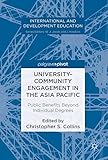University-Community Engagement in the Asia Pacific [electronic resource] : Public Benefits Beyond Individual Degrees / edited by Christopher S. Collins.
Material type: TextSeries: International and Development EducationPublisher: Cham : Springer International Publishing : Imprint: Palgrave Macmillan, 2017Description: XI, 126 p. 7 illus. online resourceContent type: text Media type: computer Carrier type: online resourceISBN: 9783319452227Subject(s): Education | International education | Comparative education | Higher education | Education | International and Comparative Education | Higher EducationAdditional physical formats: Printed edition:: No titleDDC classification: 370.116 | 370.9 LOC classification: LB43Online resources: e-book Full-text access
TextSeries: International and Development EducationPublisher: Cham : Springer International Publishing : Imprint: Palgrave Macmillan, 2017Description: XI, 126 p. 7 illus. online resourceContent type: text Media type: computer Carrier type: online resourceISBN: 9783319452227Subject(s): Education | International education | Comparative education | Higher education | Education | International and Comparative Education | Higher EducationAdditional physical formats: Printed edition:: No titleDDC classification: 370.116 | 370.9 LOC classification: LB43Online resources: e-book Full-text access | Item type | Current library | Collection | Call number | Copy number | Status | Notes | Date due | Barcode |
|---|---|---|---|---|---|---|---|---|
| E-Books | MEF eKitap Kütüphanesi | Springer Nature | LB43 (Browse shelf (Opens below)) | Available | NATURE | 1419881-1001 |
Chapter 1. Defining Academic Public Good -- Chapter 2. Post-Secondary Public Health Education: Its Meaning and Value beyond the Walls of the Academic Institution -- Chapter 3. Continued Learning in an Aging Society: A University-Community Collaborative Educational Intervention in Taiwan -- Chapter 4. Digital Heritage as a Rhetorical Tool for Community and Cultural Preservation -- Chapter 5. Creative Tourism and University-Community Engagement: The Case of Trat Province, Thailand -- Chapter 6. The Impact of University-Community Projects: A Case Study at Vietnam National University -- Chapter 7. The Challenges and Benefits of Transnational Higher Education: A Case Study of Sino-foreign Cooperation University in China -- Chapter 8. University-Community Connections and the Thai Concept of Sufficiency: The Case of 9 Boworn.
This edited volume creates a framework for understanding academic public good and offers case studies and perspectives as in depth examples of the ways in which colleges and universities engage with the community to produce social benefits. Focusing on the Asia Pacific region, the authors discuss examples of engagement that produce consciousness, partnerships, and services that are broadly available to the public and enhance the progress of society. The authors argue that, unlike an individual degree, these are public benefits that should be focused upon and featured more readily so that the breadth of university benefits come to be better understood. Christopher S. Collins is Assistant Professor of Higher Education at Azusa Pacific University, USA, and Associate Director of the Asia Pacific Higher Education Research Partnership at the East-West Center in Honolulu, Hawaii. His research focuses on the function of higher education in society and its role in social and economic progress.
5
